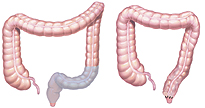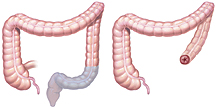Having Rectal Surgery
Having Rectal Surgery
During rectal surgery, the rectum is surgically removed. You will be given instructions on how to prepare for your surgery. Follow these instructions carefully. You will likely be admitted to the hospital on the day of your surgery. In certain cases, admission to the hospital the day before is needed. To help prepare your body, you will be instructed on what to do before surgery. Follow these instructions carefully. Ask questions if something is unclear.
Preparing a few weeks before surgery
Recommendations for preparing ahead of time for surgery include:
Have a thorough physical exam as instructed by your healthcare provider.
Ask about medicines. Tell your surgeon about all medicines you take, and ask whether you should stop taking them. This includes prescription medicines, aspirin, nonsteriodal anti-inflammatory (NSAIDs), other blood thinners like warfarin, and other over-the-counter medicines. Mention any herbs or supplements you take.
Quit smoking. Smoking increases surgery risks and slows healing.
Preparing the day before surgery
Follow any directions you are given for taking medicines and for not eating or drinking before surgery. This includes any instructions you are given for doing bowel prep.
The day of surgery
When you arrive at the hospital, you will be asked fill out certain forms. You will then change into a gown. An intravenous (IV) line will be inserted into your arm. This provides fluids and medicines. You’ll meet with your anesthesiologist or nurse anesthetist to discuss the medicine that helps you sleep during surgery. Ask any questions you have at this time. Before surgery begins, you’ll be given general anesthesia to put you into a deep sleep. A soft tube called a catheter may be placed into your bladder to drain urine.
During your surgery
What to expect during your surgery:
Your surgery may be done through one incision in your abdomen. This is called open surgery. The incision may be several inches long. Or, the surgery may be done laparoscopically. This means the surgeon makes several small incisions. A laparoscope (a thin telescope-like tube) is then placed into one of the small incisions. This allows your healthcare provider to view the surgery on a video monitor, and to operate through the small incisions.
Part or all of the rectum is resected (removed). Part or all of the sigmoid colon may also be removed. The anus may be removed as well.
If some of the rectum or anus remains, the colon may be reconnected to it. This is called an anastomosis.
If the rectum and anus are removed, a colostomy is done. This creates a new opening in the abdomen so waste can leave the body.
Once surgery is done, you’ll be taken to a recovery room.
Types of rectal resection
Below are the two types of rectal surgery. Your healthcare provider can discuss these with you.
Low anterior resection. The sigmoid colon and a portion of the rectum are removed. The descending colon is reconnected to the remaining rectum. |
Abdominal perineal resection. Part or all of the sigmoid colon and the entire rectum and anus are removed. A colostomy is then performed. |
If you have a colostomy
During a colostomy, part of the colon is connected to an opening in the abdominal wall. This new opening is called a stoma. This is where stool now leaves the body. Stool passes through the stoma into a special bag or appliance. Your healthcare team will help you learn how to care for your stoma. Adjusting to having a colostomy can seem overwhelming. But you will get lots of support. In time, caring for your stoma will become part of your daily routine.
Risks and possible complications
Risks and possible complications of rectal surgery include the following:
Infection
Injury to nearby organs, such as the kidneys
Leaking or separation of anastomosis
Blood clots
Internal bleeding
Adhesions or bowel obstruction
Risks of anesthesia
Updated:
March 21, 2017
Sources:
Overview of Colon Resection. UpToDate
Reviewed By:
Lehrer, Jenifer, MD,Sather, Rita, RN

